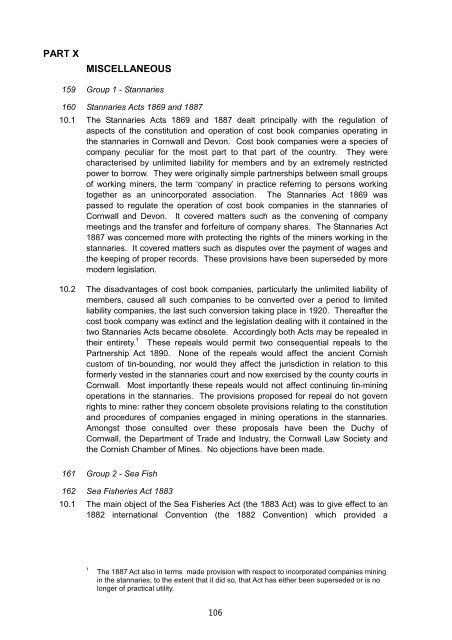STATUTE LAW REVISION: SIXTEENTH ... - Law Commission
STATUTE LAW REVISION: SIXTEENTH ... - Law Commission
STATUTE LAW REVISION: SIXTEENTH ... - Law Commission
Create successful ePaper yourself
Turn your PDF publications into a flip-book with our unique Google optimized e-Paper software.
PART X<br />
MISCELLANEOUS<br />
159 Group 1 - Stannaries<br />
160 Stannaries Acts 1869 and 1887<br />
10.1 The Stannaries Acts 1869 and 1887 dealt principally with the regulation of<br />
aspects of the constitution and operation of cost book companies operating in<br />
the stannaries in Cornwall and Devon. Cost book companies were a species of<br />
company peculiar for the most part to that part of the country. They were<br />
characterised by unlimited liability for members and by an extremely restricted<br />
power to borrow. They were originally simple partnerships between small groups<br />
of working miners, the term ‘company’ in practice referring to persons working<br />
together as an unincorporated association. The Stannaries Act 1869 was<br />
passed to regulate the operation of cost book companies in the stannaries of<br />
Cornwall and Devon. It covered matters such as the convening of company<br />
meetings and the transfer and forfeiture of company shares. The Stannaries Act<br />
1887 was concerned more with protecting the rights of the miners working in the<br />
stannaries. It covered matters such as disputes over the payment of wages and<br />
the keeping of proper records. These provisions have been superseded by more<br />
modern legislation.<br />
10.2 The disadvantages of cost book companies, particularly the unlimited liability of<br />
members, caused all such companies to be converted over a period to limited<br />
liability companies, the last such conversion taking place in 1920. Thereafter the<br />
cost book company was extinct and the legislation dealing with it contained in the<br />
two Stannaries Acts became obsolete. Accordingly both Acts may be repealed in<br />
their entirety. 1 These repeals would permit two consequential repeals to the<br />
Partnership Act 1890. None of the repeals would affect the ancient Cornish<br />
custom of tin-bounding, nor would they affect the jurisdiction in relation to this<br />
formerly vested in the stannaries court and now exercised by the county courts in<br />
Cornwall. Most importantly these repeals would not affect continuing tin-mining<br />
operations in the stannaries. The provisions proposed for repeal do not govern<br />
rights to mine: rather they concern obsolete provisions relating to the constitution<br />
and procedures of companies engaged in mining operations in the stannaries.<br />
Amongst those consulted over these proposals have been the Duchy of<br />
Cornwall, the Department of Trade and Industry, the Cornwall <strong>Law</strong> Society and<br />
the Cornish Chamber of Mines. No objections have been made.<br />
161 Group 2 - Sea Fish<br />
162 Sea Fisheries Act 1883<br />
10.1 The main object of the Sea Fisheries Act (the 1883 Act) was to give effect to an<br />
1882 international Convention (the 1882 Convention) which provided a<br />
1 The 1887 Act also in terms made provision with respect to incorporated companies mining<br />
in the stannaries; to the extent that it did so, that Act has either been superseded or is no<br />
longer of practical utility.<br />
106

















